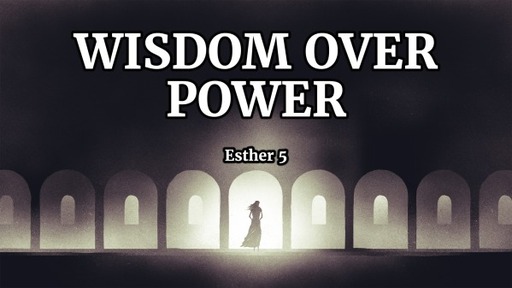Wisdom Over Power

Notes
Transcript
We live in uncertain times.
We live in uncertain times.
This is the overall sentiment today of many. To some extent I am in this category. We don’t know whether the economy will continue to rebound, what will happen politically, or how the pandemic will continue to play out. We can be unsure of many things. The unknown typically can produce a couple things:
Fear & anxiety result from uncertainty.
Fear & anxiety result from uncertainty.
Maybe it is just me but I have caught myself being a little on edge this week. Well, if I am truly honest for the past couple months. Yet, in the midst of the uncertainty God is still showing up and showing off. Because of the uncertainty around me I can choose to be open to what He will be doing.
We have the “big uncertainties” but sometimes we can focus so much on the greater issues we never deal with our individual and personal issues. Or we focus on the uncertainty in someone else’s life as a way to not deal with our own fear and anxiety.
This is a similar position we find Esther in as we open up the 5th chapter of the book with her name. There is a bunch of uncertainty. Will the king be pleased? Will she die? What will happen to Haman? If the king says yes, then what? I am sure the questions go on and on.
We need wisdom over power.
We need wisdom over power.
This is true all the time. Wisdom and power are not contradictory nor incompatible. However, power can make the need for wisdom seem unnecessary. As we move into our passage for today I want to submit to you that Esther was filled with wisdom. Wisdom we can learn from in this passage. Our circumstances are similar: the world filled with uncertainty. For such a time as this the Lord, who is in control of all things, has brought us as a church to this passage. This is no accident nor coincidence. It is a God-incidence.
Esther was prepared.
Esther was prepared.
She doesn’t come barging in to the King. She doesn’t come just as she was. No she was prepared for this meeting with her king, the king. Xerxes wasn’t calling for her, but she was going to have him notice her.
Grace/Favor allows for influence.
Grace/Favor allows for influence.
I am tempted to make a big deal of the word “pleased” as is found in verse 2. But I will try to restrain myself. Yet, I don’t think in the midst of our uncertainty, and Esther’s, we can just gloss over this. The wisdom of Esther is she doesn’t just barge into the throne room and demand her way. She allows for her beauty, I mean that is what the King liked about her, catch his eye before approaching. She allows the king to motion for her to appear before him, as if it is his idea.
Influence requires relationship.
Influence requires relationship.
It doesn’t matter if we have wisdom if we do not have relationship with people in order to use it. This is my concern and prayer for us as a church in these times. We would foster relationships in order that in their moment of crisis and need we can have influence. This is hard work. It does not always produce “results” nor is it always “efficient” nor quick. My concern for the Gospel is we as Christians who believe in the Gospel are losing our influence not because of power lost but because of relational loss.
The wisdom of patience.
The wisdom of patience.
As the story of Esther unfolds we are maybe a little crushed by the scene taking place. The king has motioned for Esther to come forth. He has said I will give you up to half my kingdom, indicating his willingness to do what she is going to ask, and we are primed for her to plead for her people. Yet, this doesn’t happen. Way to blow it Esther, we may think.
So now we get to her banquet and after a great meal, after all the king is now drinking, he gives his request again. Now is the time Esther. For such a time as this, I mean after all he is generous and a little tipsy. Yet, she pauses. Why? What is going on with Esther? Has she lost the gravity of her situation?
We just don’t know the “real” answer. All we know is this: whatever it may be there is still another chance. Whatever is going on as people who know the rest of the story, God is still in control.
The folly of speed.
The folly of speed.
The next scene gives us the picture of Haman. What a beautiful contrast if we will sit with it. The beauty of having opposites on the same page. Yet, in my desire to quickly get to the “good part” I am guilty of being a Haman.
Discontentment can lead to destruction.
Discontentment can lead to destruction.
Haman wants more. More power! More voice! More influence! And he wants all those things NOW! He is unsatisfied with what he has and the sight of one individual throws him into a rage. After all, even Haman sees the connection. He talks about how the King has honored him. He talks about how he is the special guest at a special banquet. Yet, all he can focus on is what he doesn’t have, what he has lost. Loss can be debilitating but when we grief we can start to not only sit with our loss but also see the possibilities of tomorrow.
Be careful of selfishness.
Be careful of selfishness.
Yet, how subtle selfishness can be. Most of the time I do not see it until after the fact and I look back.
Which path will you choose?
Which path will you choose?
